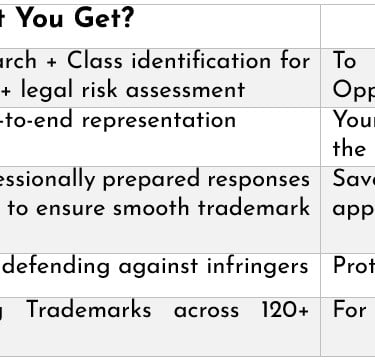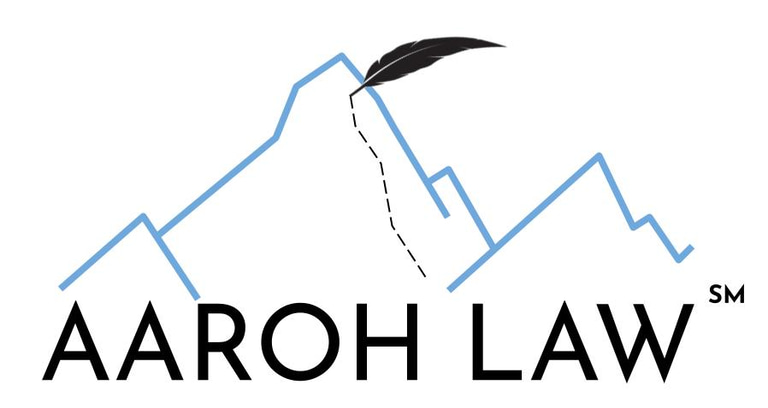Your Brand is More Than a Logo. It's Your Legacy.
Aaroh Law helps businesses secure, defend and expand their trademarks.
Practice Circle. Trade Marks
Protect What's Uniquely Yours
The Forgotten Shop Sign
In the bustling lanes of old Ahmedabad, there was a small sweet shop that everyone loved. People queued up for miles during festivals. But one year, a new shop opened just a few streets away with the exact same name and almost the same packaging. The customers got confused. The original shopkeeper lost sales, trust, and reputation until he took necessary legal action or steps to protect its trade identity.
The culprit? No registered trademark. That single missing step cost him years of hard work.
What We Do? Safeguarding your Brand
Aaroh Law offers a comprehensive suite of trademark services designed to provide robust protection for your brand, both in India and across international borders. We guide you through every step of the process, ensuring peace of mind and strategic growth.


The Difference:
Combining deep law backgrounds, experiences with transparent processes.
Attention to Detail
Every trademark is meticulously reviewed, drafted and submitted by a specialized professional, minimizing the risks of objections and ensuring stronger and defensible trademarks from the beginning.
Pan India & Cross Border Reach
From local trademark filings in India to complex international registrations in USA, UK, EU, Africa, the Middle East, China and beyond, Our expansive network covers all your trademark needs, facilitating seamless global expansion.
End to End Management
Experience complete peace of mind with a single point of contact for all your trademark requirements, from initial search and filing to handling objections and rigorous enforcement against infringers.
Transparency
We believe in clarity, truth and integrity.
For a step-by-step breakdown, see our guide The Ultimate Guide to Trademark Registration in India (2025 Edition).
Ready to Protect Your Brand?
You didn’t come this far to stop
Check Your Brand's Availability
Begin your journey with a complimentary search to assess your brand's unique presence in the market. It's the first step towards ironclad protection.
Book Your Consultation
Connect with an expert for a personalized discussion about your trademark strategy. We're here to answer all your queries.

Frequently asked questions
Q.1. What is the official "ideal" time taken for trademark registration in India?
A. The trademark registration process in India typically takes 1 to 1.5 years for a smooth application without any objections from the registry or third parties. This timeframe includes filing, examination, advertisement in the Trademark Journal, and finally, registration. For those with urgent requirements, the fast-track examination option can significantly expedite the process, potentially leading to registration in as little as 6 months.
Q.3. Can I use TM before my trademark is registered?
A. Yes, you can use the ™ (trademark) symbol immediately after you file your application. This indicates a claim of ownership and is a legal signal that you intend to seek formal protection for the mark. However, you must use the ® (registered trademark) symbol only after the mark has been officially registered and you have received the registration certificate. Using the ® symbol before this is a legal offense under the Indian Trade Marks Act.
Q.4. How much does it cost to file a trademark in multiple countries?
A. The cost for international trademark filing is highly variable and depends on the specific countries and classes of goods or services. It is not a fixed fee.
A commonly suggested cost-effective method is often the Madrid Protocol, which allows you to file a single application to seek protection in over 130 member countries. However, even with this system, the costs are tiered:
A base fee paid to the WIPO (in Swiss Francs).
Individual fees for each country you designate, which can vary significantly.
For countries not part of the Madrid Protocol, a direct national filing is necessary, which involves hiring a local attorney and paying separate fees for each country. This route is typically more expensive per country than the Madrid system.
A precise quote is impossible without a defined strategy, as costs are directly tied to the number of countries and classes. It is crucial to work with a lawyer to build a strategic and cost-effective filing plan.
Q.5. What if my trademark is opposed?
A. If your trademark application in India faces an opposition from a third party, it is a critical stage that requires a strategic legal response. The process involves filing a counter-statement to the opposition notice, backed by a strong legal and factual foundation. A skilled legal team will then manage all subsequent procedures, which may include filing evidence and representing you in hearings before the Trade Marks Registry. An expert's role is to meticulously defend your rights and ensure the best possible outcome, upholding the integrity of your brand.
Q.6. Do I need a lawyer for trademark filing?
A. While the law permits self-filing, it is a misconception that a lawyer is not necessary. From a practical and professional standpoint, hiring a qualified lawyer is essential for ensuring your application is not just filed, but is also strong and defensible.
A lawyer's value lies in:
Expert Search: They conduct comprehensive searches to identify potential conflicts and risks.
Accurate Drafting: They draft a precise application with a carefully worded and acceptable descriptions of goods and services to maximize the scope of protection.
Effective Responses: They have the expertise to respond to complex office objections and, more importantly, to file strong and timely responses to oppositions, which is where most self-filed applications fail.
Navigating trademark registration can raise many questions. Here are some of the most common observations we receive, designed to provide you with clear, concise answers to help you understand the process better.
Q.2. Beyond the official timeline, what are the most common real-world factors that can cause significant delays in the trademark registration process, and what proactive steps can a legal professional take to mitigate these risks?
A. While a smooth, unopposed application may be completed within 1 to 1.5. years, it is more realistic to budget for a timeframe of 2 years. The primary reason for this discrepancy is the time taken by the Office of the Trade Marks Registry to process each stage, keeping in mind the examination procedures, procedural lapses and backlogs.
Here is a transparent and more practical breakdown of the timeline:
Stage of Filing to Examination: This can take anywhere from 6 to 12 months due to the sheer volume of applications and registry backlogs.
Stage of Examination to Publication: If the examiner raises objections (a very common occurrence), responding to the objection and getting it accepted can add another 6 to 12 months to the process.
Stage of Publication for Opposition: The trademark is published for a mandatory period of 4 months, during which any third party can file an opposition.
Post-Opposition Period: If no opposition is filed, registration is granted within 3-6 months.
For urgent needs, a fast-track examination is available to expedite the initial examination.
Every great brand starts with a name. Every great name starts with protection.
Your trademark is your identity, your reputation and your future. Don't leave it vulnerable, Let's make it untouchable.


